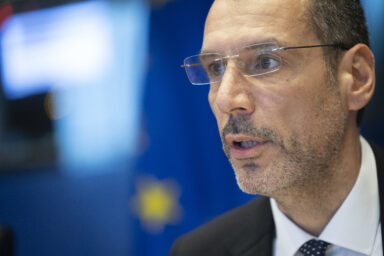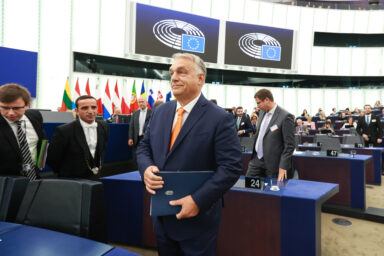The rise of Generative AI breeds a brand new copyright challenge in Europe. Critics warn against inadequate protection for content being taken over by Gen AI. Proposed remedies include compensation, a licensing regime, and comprehensive opt-outs for creators.
“Content that is protected is being taken over by AI, and we have not been able to protect this adequately,” said MEP Axel Voss (EPP/DE) during a meeting of the Parliament’s Legal Affairs Committee (JURI). The parliamentarians discussed his draft report on “Copyright and Generative Artificial Intelligence – Opportunities and Challenges”.
Innovation vs remuneration
Europe’s dilemma begins with the data that trains Gen AI. According to the European Parliamentary Research Service, current law “does not yet fully address issues related to AI models and intellectual property”. While the Copyright Directive introduced text-and-data-mining exceptions and the AI Act obliges developers to disclose their sources, both instruments leave “legal limitations and uncertainty”.
To face these issues, Mr Voss’ report seeks a “fair balance” between creative rights and technological progress. To achieve that, lawmakers look into a European licensing and transparency system designed to make AI training lawful, accountable, and profitable for both sides. He suggests solutions, such as automatic licensing mechanisms, registers with machine-readable “stop signals” for protected works, and greater disclosure of training data.
The report in question urges the Commission to “immediately impose a remuneration obligation on providers of general-purpose AI models”. The recommendation is a copyright fee of 5 to 7 per cent of global turnover for AI developers using European content.
You might be interested
A licensing market
Left-leaning MEPs backed the idea of a transparent licensing market. Speaking on behalf of his faction, René Repasi (S&D/DEU) said the Socialists were ready to find a balanced compromise, provided “creators are fairly remunerated when their works are used to train AI”. He favoured collective licensing solutions under existing copyright rules to deliver quick results.
On the Greens side, French MEP David Cormand agreed on the need for more transparency and creator rights. “We need transparency. We need to organise a licensing market. It is not a free market, some are stealing and others are being stolen from,” he stated.
Content that is protected is being taken over by AI, and we have not been able to protect this adequately – MEP Axel Voss (EPP/DEU)
However, not all MEPs share the appetite for new rules. Tobiasz Bocheński (ECR/POL), while recognising the challenges, asked for caution. “We have to be careful not to have too many new regulations, and we have to move away from imposing further burdens,” he said. He argued that more oversight could stifle European companies, arguing that the internal market “is the best regulator”.
Text-and-data-mining exceptions
A crucial part of the discussion concerns the text-and-data-mining (TDM) exception under the 2019 Copyright in the Digital Single Market Directive. The exception lets AI companies automatically scan and analyse online material they can legally access, unless creators have clearly said no. This means most online content is open for AI training by default. Nevertheless, under Article 4 of the EU Copyright Directive, creators themselves can opt out of AI systems mining their works for data.
The European Commission’s representative at the committee confirmed that Brussels is reviewing the functioning of this exception and the feasibility of an EU-wide opt-out registry. “We commit to improving the practical functioning of the opt-out mechanism,” the representative said. Adding that the Commission will “explore which type of measures could effectively help the conclusion of licensing agreements, covering the training and the deployment of AI models and provide remuneration opportunities”.
But in his report, Mr Voss goes further. He proposes that if an AI provider fails to disclose its training sources, there should be an “irrebuttable presumption” that they used protected works. Moreover, it proposes giving the European Union Intellectual Property Office a central role. To manage a Union-wide register of opt-outs and licences.
Financial impact
Beyond economics, the report highlights what it calls the democratic dimension of copyright. The press, it argues, “holds a vital role in safeguarding democracy”. The report warns that generative AI systems must not “favour certain publications over others” or undermine media pluralism.
These concerns come as AI systems are becoming a major source of information. Around 15 per cent of people under 25 now rely on AI tools for news, according to a study by the Reuters Institute. When AI platforms summarise articles or answer questions directly, as Google AI overview, publishers lose traffic and ad income, deepening the financial crisis of independent journalism.
We are committed to improving the practical functioning of the opt-out mechanism. — European Commission statement
To face this challenge, Mr Voss proposes compensation for automated processing of press content and clearer rules to ensure sources remain identifiable. This includes potential citation obligations for AI outputs.











